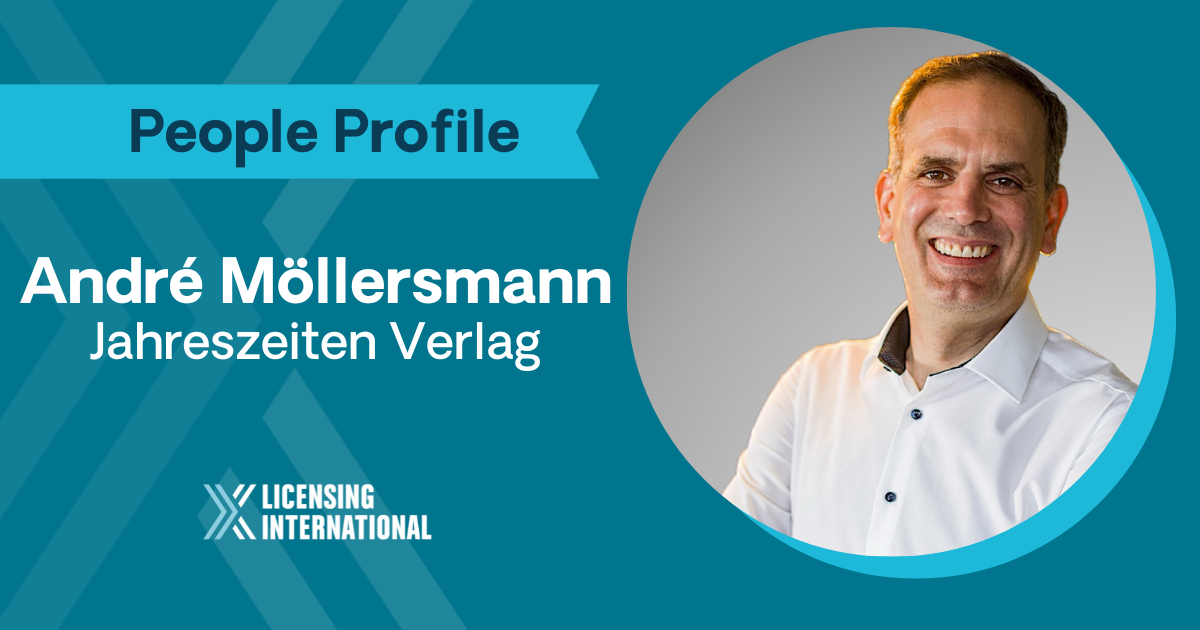People Profile: André Möllersmann, Director of Strategic Partnerships & Licensing at Jahreszeiten Verlag

How did you get into licensing (or how did licensing find you)?
My first connection to the licensing industry was in 2004, when I oversaw the international brand and licensing division of Gruner + Jahr (Bertelsmann) and thus also the internationalization of GEO magazine. At that time, the focus was on attracting international publishing houses for B2B investments in the form of licenses. I joined the German licensing industry at the beginning of 2012, when I took on the challenging task of setting up a new in-house licensing agency for the Burda Group. During that time, I quickly met the colorful and diverse licensing industry and its many great colleagues, who have become friends over the years.
What’s a “typical” day in your current position?
My current challenge is to establish various premium brands from the food, design, and travel sectors as licensed brands in Germany and to develop the necessary organizational structure. After initial successes this year, the signs are pointing towards continuing the growth course next year—this means that I am currently talking to many potential licensees from a wide range of sectors, expanding contact with existing partners and, of course, holding many discussions with internal colleagues to generate enthusiasm for this new business unit of the company.
What’s your biggest personal or professional accomplishment?
Together with a great team of enthusiastic and highly motivated colleagues, I have twice succeeded in establishing new and profitable business units in traditional corporate structures. Burda Brand Licensing, for example, was already profitable in its second year and was even able to convince external clients such as Elle and Instyle to become their licensing agency. To date, the agency has realized over 700 collaborations.
What are the most significant trends or changes that you’ve seen in the business in recent years?
The industry is more diverse and the transitions to other sectors have become more fluid. Corporate brands and adult brands are now more in focus and complement the previous cornerstone children’s brands. Celebrity brands are also increasingly the subject of the licensing industry. In addition, the megatrends of digitalization and environmental protection as well as the requirements of the new Gen Z as a target group of buyers or future employees are also reflected here.
In your opinion, what is the top skill every licensing executive should have in order to succeed?
Flexibility and resilience. The licensing business is a constantly changing and evolving industry, which requires adaptation skills and endurance. And social skills—behind every brand and product is a person with a different mindset, way of thinking, and lifestyle, which is part of the joy of the business but can also be demanding.
What’s the best piece of advice you’ve ever received, or what’s your favorite quote?
“The moment you’re ready to quit is usually the moment right before a miracle happens—don’t give up.” It means nothing more than persevering and keeping at it until the goal is reached. That’s what I stand for.
What is your favorite licensing deal of all time? (It doesn’t have to be one that was signed by you.)
The licensing deal that I find the most incredible and that shows what is possible is a deal that our colleagues at RTL made with the Tank & Rast petrol station chain a few years ago based on the TV series Alarm for Cobra 11 Schnitzel. I always have it with me as a showcase in my presentations when I want to show how far licensing goes.
If you weren’t in licensing, what would you be doing now?
I would be in a university environment and would introduce students to licensing as a part of marketing and get them excited about it.
The last licensed product I bought was…
A leather notebook bag from Bugatti.




